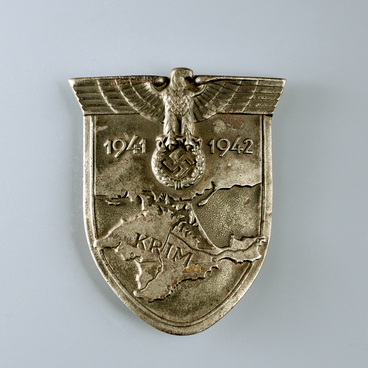Soldier’s capsule for ID paper tag in the form of a plastic octahedral cylinder were introduced by the order of the People’s Commissariat of Defense of the Soviet Union of March 15, 1941. In such a case, a note was kept, according to which it was possible to establish the identity of the soldier in the event of his death.
The soldier’s capsule on display belonged to the war correspondent, writer Leonid Rakhmanov, a native of the city of Kotelnich, Vyatka province. In the late 1920s, he began publishing the first stories about student life. In 1929, Rakhmanov’s first story called “Polneba” (Half the Sky’ in Russian) was published in the Leningrad magazine ‘Zvezda’, followed by the stories ‘The Tribal God’ about the life of young students in the late 1920s, ‘Basil’ and ‘A Clever Boy’, written under the impression of the trip to the north.
In 1936, Rakhmanov wrote the script for the film ‘Baltic Deputy’, which brought him fame. In 1937 he created the play ‘Restless Old Age’, which was staged in more than 400 theaters in the USSR. For example, in 1956 the play was staged at the Moscow Art Theater named after Maxim Gorky.
During the Finnish campaign of 1939-1940 and at the beginning of World War II, Rakhmanov served as a war correspondent. On June 22, while working on the plot of one of his books, he did not hear Molotov’s speech on the radio in which he announced that the Nazi forces had attacked the USSR) and found out about the beginning of the war only in the evening. The military registration and enlistment office sent him to the Northern Fleet. The correspondent’s articles and notes about the heroes of the battles in the Arctic began to appear regularly in newspapers.
Rakhmanov worked at the front line of the Kandalakshsky direction. He completed his military service with the rank of lieutenant colonel of the intendant service of the first rank and was honored with16 government awards. Among them were three Orders of Honor of the Patriotic War (2nd class), the Order of the October Revolution, 11 medals, including ‘For the Defense of the Arctic’ and ‘For the Defense of Leningrad’, as well as the ‘Veteran of the Karelian Front’ badge.
Rakhmanov dedicated the plays ‘A Window in the Forest’ and ‘A Stone Thrown into a Quiet Pond’ to the events of the war years. In the post-war years, the writer lived in Leningrad, where he headed the Central Literary Association under the Union of Writers of the USSR.
The soldier’s capsule on display belonged to the war correspondent, writer Leonid Rakhmanov, a native of the city of Kotelnich, Vyatka province. In the late 1920s, he began publishing the first stories about student life. In 1929, Rakhmanov’s first story called “Polneba” (Half the Sky’ in Russian) was published in the Leningrad magazine ‘Zvezda’, followed by the stories ‘The Tribal God’ about the life of young students in the late 1920s, ‘Basil’ and ‘A Clever Boy’, written under the impression of the trip to the north.
In 1936, Rakhmanov wrote the script for the film ‘Baltic Deputy’, which brought him fame. In 1937 he created the play ‘Restless Old Age’, which was staged in more than 400 theaters in the USSR. For example, in 1956 the play was staged at the Moscow Art Theater named after Maxim Gorky.
During the Finnish campaign of 1939-1940 and at the beginning of World War II, Rakhmanov served as a war correspondent. On June 22, while working on the plot of one of his books, he did not hear Molotov’s speech on the radio in which he announced that the Nazi forces had attacked the USSR) and found out about the beginning of the war only in the evening. The military registration and enlistment office sent him to the Northern Fleet. The correspondent’s articles and notes about the heroes of the battles in the Arctic began to appear regularly in newspapers.
Rakhmanov worked at the front line of the Kandalakshsky direction. He completed his military service with the rank of lieutenant colonel of the intendant service of the first rank and was honored with16 government awards. Among them were three Orders of Honor of the Patriotic War (2nd class), the Order of the October Revolution, 11 medals, including ‘For the Defense of the Arctic’ and ‘For the Defense of Leningrad’, as well as the ‘Veteran of the Karelian Front’ badge.
Rakhmanov dedicated the plays ‘A Window in the Forest’ and ‘A Stone Thrown into a Quiet Pond’ to the events of the war years. In the post-war years, the writer lived in Leningrad, where he headed the Central Literary Association under the Union of Writers of the USSR.



